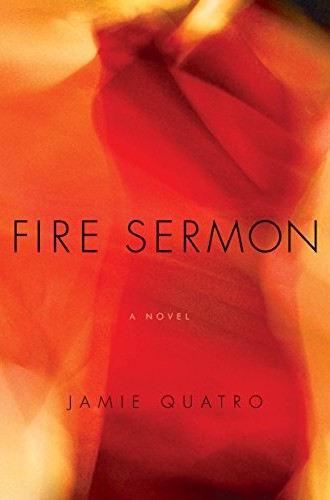Is Jamie Quatro’s novel really about marital infidelity?
Maybe Fire Sermon is more fundamentally a parable about religion.
In Jamie Quatro’s ambitious debut novel, Maggie is a 45-year-old mother of two, devoted to her family and to God. When she falls in love with James, a poet she meets at a conference, desire and guilt war within her, both before and after their one night together. The story unfolds in a nonchronological pastiche of forms: first-person narrative, third-person narrative, descriptive prose poems, emails, text messages, prayers, a sermon, and dialogues between Maggie and an anonymous partner (or partners) who could be a therapist, God, or an internal devil’s advocate. The unconventional form works—especially the correspondence between Maggie and James, which perfectly nails the elaborately casual tone adopted in email early in a relationship. Quatro’s prose is poetic, economical, and effective.
But Fire Sermon lacks the electrifying power of the stories in Quatro’s first collection, I Want to Show You More. Her short fiction is weird, gothic, startling, and profound, reminiscent of the work of Flannery O’Connor and Gabriel García Márquez. Fire Sermon is missing that charged magic. The novel ruminates on the relationship between desire and faith, but ultimately it fails to deliver profound or convincing revelations about the nature of either.
Read our latest issue or browse back issues.
Part of the problem is that the characters are so pretentious and privileged. Maggie and James are people who read Moby-Dick in its entirety to their third-grade children. They discuss apophatic literature and postcolonial reinterpretations of Genesis. When they meet for the first time, Maggie notices James’s tattoos: on one wrist, the word sight, and on the other, vision.
The way that Maggie’s desire for James consumes her life is hard to swallow, too. She’s a woman with every privilege, including an enormous inheritance, and yet she gives all her energy to managing her desire for the one thing she can’t have. It is difficult to take her angst seriously.
I had to wonder, knowing Quatro’s skill, if she intended for these characters to be as ridiculous as they are; I’m still not sure. But the novel as a whole, like the characters, is self-serious and heavy-handed, wearing its allusions on its sleeve like James wears his tattoos on his wrists. Take the names, for instance: Maggie Ellmann, an obvious nod to Mary Magdalene, and James Abbott, a priestly figure—one whose name also calls to mind the brother of Jesus, the one who said, “Each person is tempted when they are dragged away by their own evil desire and enticed. Then, after desire has conceived, it gives birth to sin; and sin, when it is full-grown, gives birth to death” (James 1:14–15). In case it wasn’t clear already, this book is about desire and God—and it isn’t joking around.
Near the end of the book, one of Maggie’s anonymous conversation partners, possibly a shrink, encourages her to try to express her beliefs about faith and longing. Maggie’s resulting “Fire Sermon” offers a genuinely surprising conclusion. She argues that “the institution of marriage was given to us as an intentional breeding ground for illicit desire.” It is only when things are forbidden, she claims, that we can truly desire them, and so the structure of marriage, by forbidding extramarital affairs, teaches us how to desire, and specifically, how to desire God.
“So this is where you’re going to land?” the anonymous voice asks when she finishes. “James a lure toward the eternal?” Maggie explains that she “must” land there and then imagines the future she hopes waits for her on the “far side of fidelity.” In this imagined future, she stays with her husband, Thomas, they grow old together, and their imperfections are slowly worn away. She sees Thomas with dementia and herself taking care of him, and she concludes, “At the end of all things, when Love comes and asks me what I know, I will point to them, sitting there in the shade. I will say: This man. This woman.”
It’s worth noting that with these words, Maggie is riffing on a line by poet Sharon Olds—a writer whose poetry collection James had given her. Even Maggie’s final vision of marital love is colored by her affair.
Many readers may see this ending scene as a beautiful picture of love that perseveres through failure and struggle. But for me, it’s absolutely unsatisfying. Maggie’s life with Thomas, as far as readers can see, has been marked by a lack of emotional and physical connection. It’s been a life of joyless anxiety and even abuse, as Thomas repeatedly forces himself on Maggie. Are we to understand that we ought to stay in such marriages so that we can learn to desire God? And are we to believe that once we marry, we will lose any sexual desire for our spouses, and that this is God’s design? If the novel is intended to portray the beauty of fidelity, it utterly fails to convince.
But what if it isn’t a story about marriage but a parable about religion? Early on, Maggie is attracted to James because although he’s a formalist poet, there is a “riot” within the structure of his lines. In her “Fire Sermon,” she argues that it is the structure of marriage that allows desire to riotously thrive. What if Quatro is not really talking about marriage at all, but about the life of faith? What if she’s arguing that the riot of human life exists best when we remain within the structure of religion, faithful to our commitments as well as to our doubts? (Maggie’s husband, after all, is named Thomas, like the doubting disciple.) Perhaps the church, like Thomas, is both abusive and loving, but when we remain committed to it, we both are refined. Perhaps it’s only within the form of faithfulness that we can find meaning in life.
If this is the motivating idea behind Fire Sermon, it is at least an interesting idea. But its power is weakened by the metaphor of marriage and by characters too myopic to have either sight or vision.







